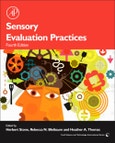Understanding what the consumer wants and will accept are two of the most significant hurdles faced by anyone in new product development. Whether the concern is the proper mouth-feel of a potato chip, the sense of freshness" evoked by a chewing gum, or the weight and texture of a cosmetic, if the consumer doesn't find the product acceptable, it won't sell. Sensory evaluation testing is the process that establishes the consumer acceptability of a product. It can help identify issues before general production is begun and potentially bring to light issues that hadn't previously been considered a factor in the success of the project.
Table of Contents
1. Introduction to Sensory Evaluation 2. The Organization and Operation of a Sensory Evaluation Program 3. Measurement 4. Test Strategy and the Design of Experiments 5. Discrimination Testing 6. Descriptive Analysis 7. Affective Testing 8. Strategic Applications 9. Epilogue
Authors
Herbert Stone Sensory Consulting Services, IFT Past President, Visiting Professor, Zhejiang Gongshang University. Herbert Stone, Ph.D. is Senior Advisor & Co-Founder of Tragon Corporation where he served as President from 1974-2008. A former Director of Stanford Research Institute's (SRI) Food & Agricultural Sciences Department, Dr. Stone was President of the Institute of Food Technologists (IFT) from 2004-2005. With a Ph.D. from U.C. Davis, he has lectured worldwide, is the author of over 150 publications, and holds six patents. Dr. Stone founded Tragon� in 1974 with Joel L. Sidel. Dr. Stone serves as the Scientific Editor for the Sensory and Quality Section of the Journal of Food Science. He also serves on the Univ. of Massachusetts and UC Davis advisory boards and also serves as Adjunct Professor, Fuzhou University and Visiting Professor, Southern Yangtze University. He chairs the Sensory Science Scholarship Fund. He is the 2010 recipient of the ASTM E18 Peryam Award for contributions to the science of sensory evaluation. Rebecca N. Bleibaum President/Chief, Sensory Intelligence of Dragonfly SCI, Inc.. Rebecca N. Bleibaum, M.A., is President/Chief, Sensory Intelligence of Dragonfly SCI, Inc. a sensory and consumer insights research company in the San Francisco Bay Area, specializing in product testing and professional education. Bleibaum has over 25 years of experience in applied research from Tragon Corporation as their Chief Sensory Officer. She is co-developer and instructor of UC Davis Extension's popular and long running "Applied Sensory & Consumer Science�. In 2016, she was awarded the prestigious UC Davis Extension Outstanding Service Award for her contributions and dedication to the University's continuing education program. (www.dragonflysci.net)Bleibaum is co-author of Sensory Evaluation Practices, Fourth Edition (2012), A Practical Guide to Comparative Advertising: Dare-to-Compare (est. 2018), previous Chair of ASTM International, Committee E-18 on Sensory Evaluation, has received five ASTM awards for contributions and the Award of Merit, has spoken at numerous professional events, and had given hundreds of impactful client presentations over the years in wine, beer, and a wide variety of FMCG products. Bleibaum's goal is to teach the fundamentals of sensory and consumer science to entrepreneurial spirited teams to help them become more successful in the marketplace. Heather A. Thomas Dragonfly SCI, Inc., Santa Rosa, CA, USA. Heather A. Thomas is Chief, Data & Analytics, as a partner in Dragonfly SCI, Inc. Thomas received her B.S. in Food Science from U.C. Davis. She is co-author, with Stone and Sidel, of Hitting the Target: Sensory and Product Optimization.Thomas was a key member of Tragon Corporation from 1989 to 2017. As their Vice President of Research and Analysis, she played an integral part in the development of product optimization methods, segmentation analyses, and advanced multivariate analysis and modeling techniques. Her extensive experience with experimental design and choice-based modeling has helped guide multinational companies to create products that appeal to consumers. As the developer of the Key Drivers MaximizerTM, she has created an operational predictive tool that integrates sensory, consumer, and instrumental measurements to guide product development and marketing groups.
Thomas has over 25 years of experience training QDA panels, analyzing their performance, and interpreting the results. Her training and support had been under the guidance of the founders of the original QDA method, Herbert Stone and Joel L. Sidel. As part of empowering the sensory industry, she regularly travels around the world, teaching sensory scientists the power of trained panel data and panel performance measures.
Thomas received her B.S. in Food Science from U.C. Davis where she focused her education in Sensory Science under Rosemary Pangborn. She is co-author, with Stone and Sidel, of Hitting the Target: Sensory and Product Optimization, a seminal article on sensory and consumer-based product optimization techniques.








